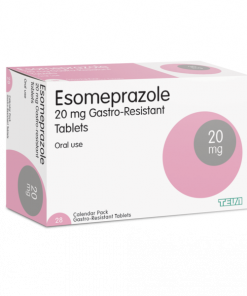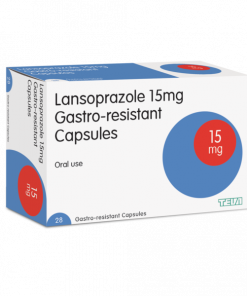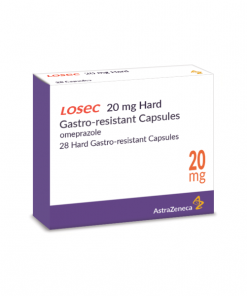-
NHS
-
Oldham ServicesMenu
-
Shop
-
Help & Advice
-
Menu

If you’ve ever felt the burning sensation of acid reflux or the uncomfortable feeling of indigestion, you’re far from alone. These issues are common, affecting 1 in 5 adults in the UK. The discomfort can range from mild to severe, and for some, it’s a recurring problem that can significantly impact daily life. Medications like Esomeprazole and Lansoprazole are often recommended to manage these symptoms. But what exactly are these medicines, and how do they differ from each other?
|
Criteria |
Esomeprazole |
Lansoprazole |
|
Dosage |
Once Daily |
Once Daily |
|
Effectiveness |
Slightly more effective than Lansoprazole, according to some studies |
Effective but slightly less so than Esomeprazole |
|
Long-Term Risks |
Potential increased risk of dementia |
Potential increased risk of dementia |
|
Availability in UK |
Available on prescription and over-the-counter at lower dosages |
Available on prescription and over-the-counter at lower dosages |
|
NHS Guidelines |
Use under medical guidance |
Use under medical guidance |
|
Side Effects |
Common: Headaches, nausea, diarrhoea, constipation, flatulence. Serious: Kidney issues, bone fractures, low magnesium levels |
Common: Headaches, stomach pain, diarrhoea, constipation. Serious: Liver problems, kidney inflammation, severe skin reactions |
Esomeprazole and Lansoprazole are both types of medicines known as Proton Pump Inhibitors (PPIs). They work by reducing the amount of stomach acid your body produces, offering relief from symptoms like heartburn and acid reflux.
Both Esomeprazole and Lansoprazole are widely available in the UK. You can get them through a prescription from your GP or pharmacist, and some forms are also available over the counter.
The NHS recommends both Esomeprazole and Lansoprazole for treating conditions related to excess stomach acid. However, your GP or pharmacist will consider your specific symptoms and medical history before prescribing one over the other.
Both Esomeprazole and Lansoprazole are PPIs primarily used to treat conditions related to excess stomach acid:
PPIs work by blocking the proton pumps in the stomach lining. This action reduces the amount of stomach acid produced, relieving symptoms and allowing any damage to heal. This is crucial for conditions like GORD, where excess stomach acid can cause significant discomfort and complications if left untreated.
The NHS supports the use of both medications for treating stomach-related conditions. However, it’s crucial to consult your GP or pharmacist for a prescription tailored to your specific symptoms and medical history. They will consider various factors like your age, other medications you’re taking, and your overall health before prescribing the most suitable medication for you.
When you’re dealing with stomach issues like acid reflux or indigestion, effectiveness is a key factor in choosing a medication. Both Esomeprazole and Lansoprazole are popular choices, but how do they compare?
Erosive esophagitis is a condition where the oesophagus becomes inflamed due to stomach acid. One study analysed the efficacy of Esomeprazole at a dosage of 40 mg and Lansoprazole at 30 mg and found that Esomeprazole healed moderate to severe erosive esophagitis faster and in more patients compared to Lansoprazole. Specifically, the healing rates at week 8 were 82.4% for Esomeprazole and 77.5% for Lansoprazole. The second study supported these findings, showing that Esomeprazole at 40 mg had significantly higher healing rates of 92.6% compared to 88.8% for Lansoprazole at 30 mg. However, the effectiveness can vary from person to person, making it essential to consult your GP or pharmacist for a treatment plan tailored to you.
When it comes to the effectiveness of treating GERD, studies have shown some differences between the two medications. Clinical trials have indicated that Esomeprazole treatment yielded significant improvement in clinical signs and symptoms of GERD compared to a placebo group. Another comprehensive study showed that Esomeprazole is more effective than Lansoprazole in providing resolution of GERD-associated symptoms. These findings suggest that Esomeprazole might be more effective, especially for more severe cases.
The NHS doesn’t specifically recommend one medication over the other for these conditions. Their general advice is that both should be used under medical guidance to ensure the most effective treatment.
When choosing a medication for acid reflux or indigestion, it’s crucial to be aware of the potential side effects. Both Esomeprazole and Lansoprazole are generally well-tolerated, but they do come with their own set of risks.
Both Esomeprazole and Lansoprazole have a range of common side effects. These are usually mild and often go away on their own. However, it’s always best to consult your GP or pharmacist if they persist:
While rare, both medications can cause more severe side effects. If you experience any of the following symptoms, it’s crucial to seek medical help immediately. Here are some serious side effects to watch out for:
A study comparing Esomeprazole (40 mg) with lansoprazole (30 mg) in the treatment of erosive esophagitis found both treatments to be taken without problems. The NHS provides guidelines stating that both medications are generally safe but should be used under the guidance of a healthcare professional. Your GP or pharmacist will take into account your medical history and any other medications you’re taking before prescribing either Esomeprazole or Lansoprazole.
Despite their widespread use and excellent safety profile, concerns have been raised about the long-term effects of proton pump inhibitors. These concerns include potential adverse effects like hypergastrinemia, the development of pneumonia, and drug interactions.
The NHS advises that both medicines should be used under medical guidance for the most effective and safest long-term treatment. They don’t specifically recommend one over the other for long-term use.
A recent study published in 2023 found that prolonged use of proton pump inhibitors, including Esomeprazole and Lansoprazole, could increase the risk of dementia. However, this risk only became significant after more than four years of use, with a 33% greater risk of developing dementia. It’s important to note that the study did not necessarily find that taking a proton pump inhibitor directly resulted in a higher risk, but rather, the duration of use was the key factor.
Both Esomeprazole and Lansoprazole are available on prescription in the UK. Your GP or pharmacist will assess your symptoms and medical history before prescribing the most suitable medication for you. There are some lower-dose over-the-counter options that don’t require a prescription:
The NHS advises that both Esomeprazole and Lansoprazole should be used under medical guidance.
Both Esomeprazole and Lansoprazole are effective options for treating stomach issues like acid reflux and indigestion. While studies hint at Esomeprazole being slightly more effective, both have their own set of potential side effects and long-term risks. Availability in the UK is broad for both, with options for prescription and over-the-counter purchases.
At Click2Pharmacy, our regulated online UK-based pharmacy has a dedicated acid reflux clinic. We can help you find the right treatment whilst offering 100% confidentiality with the best online pharmacy prices. Complete our online assessment to buy Esomeprazole or Lansoprazole online.
Studies suggest that Esomeprazole may be slightly more effective, especially in healing rates for conditions like Erosive Esophagitis.
Yes, both are available over the counter, but Lansoprazole is generally at lower dosages.
Both medications have potential long-term risks, including an increased risk of dementia and other adverse effects.
The NHS advises using either medication under medical guidance and doesn’t specifically recommend one over the other.
Common side effects of Esomeprazole include headaches, nausea, and diarrhoea. For Lansoprazole, common side effects include headaches, stomach pain, and diarrhoea.




